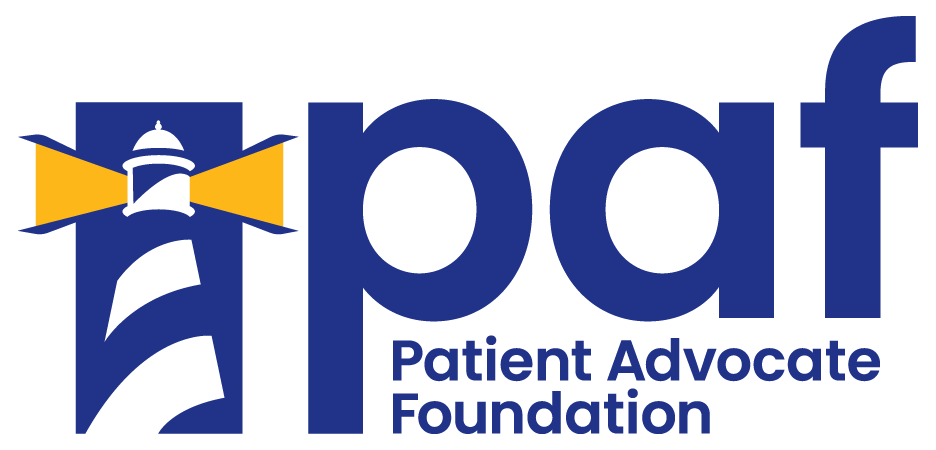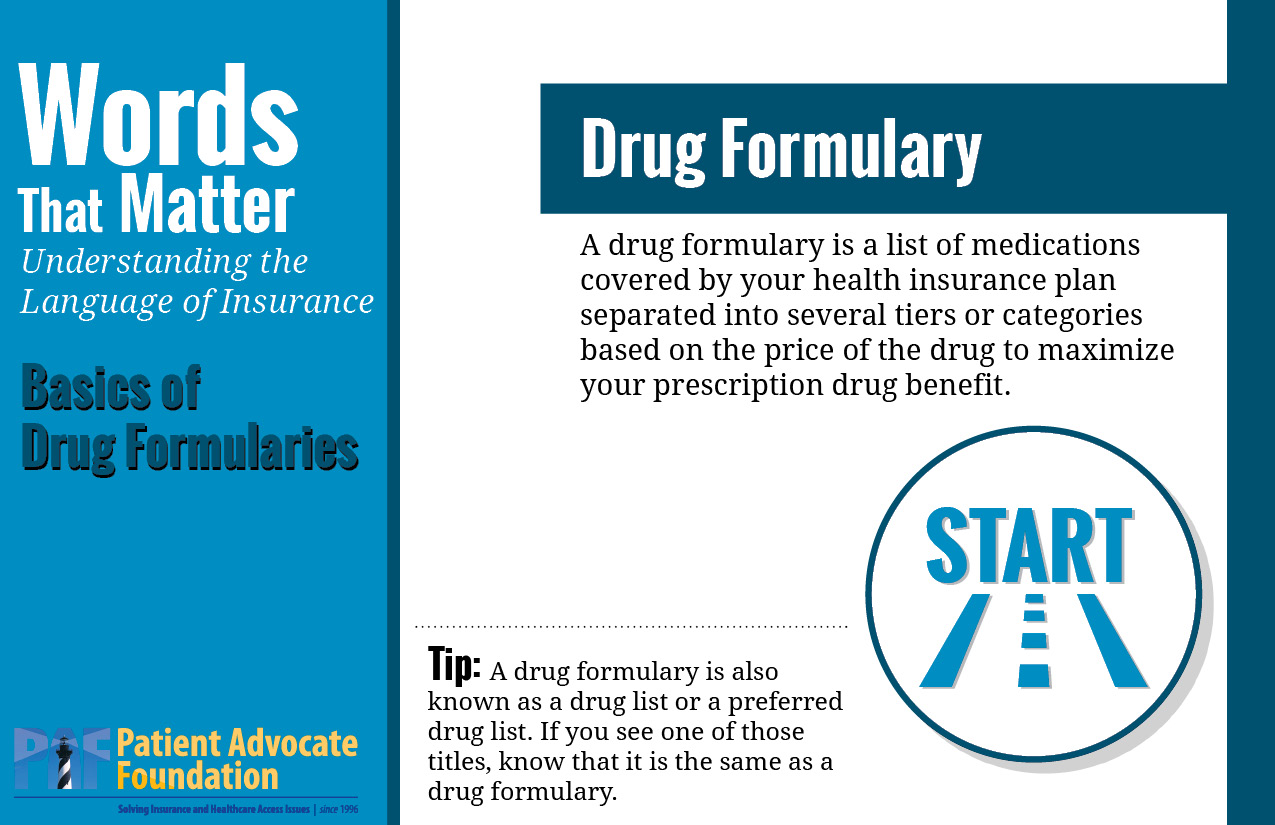The Language of Insurance
Words That Matter

A Patient’s Healthcare Glossary
Illustrated in recent survey data, Patient Advocate Foundation has documented that for some of the most commonly used terms surrounding healthcare and health insurance, as little as 59% of patients felt that they were confident in the meaning of the words.
Critical vocabulary used during enrollment and the usage of health insurance, including deductible, co-payment, network, covered services and excluded services are too frequently confused by patients. In addition, our survey data has shown a distinct correlation between the understanding of these words and the ease of enrollment process and also a patient’s ultimate satisfaction of the plan they selected.
Healthcare policies, laws and trends are discussed practically everyday in the news and even at the watercooler. This list of words provides terms that can impact your healthcare and the healthcare of everyone around you.Plain Language Glossary for Terms Used by Your Plan
To reduce this confusion and help patients better understand the jargon they will likely encounter in healthcare, the below glossary is a resource to help patients understand these words with plain language definitions.
Health insurance offered by private for-profit companies in exchange for a premium paid by enrollees. Commercial insurance plans can be structured in many different ways and are frequently offered with numerous plan types. Also known as private health insurance. Also known as Private Insurance.
An agreement between you and your insurer where they cover some of your health care costs in exchange for a premium. If you have coverage in place, you have agreed to the terms of the agreement.
The entire package of defined medical procedures, therapies, prescriptions and services listed within your insurance plan documents in which the insurer agrees to provide compensation on your behalf. Also known as Benefits.
The medical services, procedures or treatments that are listed within your coverage details that the insurer has agreed to provide payment on your behalf.
Health insurance sponsored and coordinated by your employer and available to you as an employee. Many employer-based health plan premiums are covered in part by the employer, lowering the amount you owe in premiums. Also referred to as job-based health plans.
The date when you signed up for health insurance and officially submitted your application and enrollment paperwork.
A wallet-sized card issued by your insurer when enrollment is complete and coverage begins. The card serves as proof of insurance and contains basic information regarding the insured member, the plan structure, co-payments and co-insurance and has contact information to reach the insurer.
A shopping resource where people can compare, research and purchase insurance plans for the next plan year. Marketplaces are available in each state and are the only places where you can qualify and receive premium tax credits to help offset the cost of your monthly premium for the plan you select. Also known as Marketplace.
A type of contract in which you agree to pay a premium to a company in exchange for help paying for the cost of medical services should you require them during the time period of coverage. You must pay the premium even if you do not receive any care during that period. Also known as Insurance.
A plan where you pay a higher premium in exchange for defined co-payments and co-insurance amounts associated with care due at the time of service. Most HMO's do not have a deductible, and are structured to reduce the exposure to large out-of-pocket costs. HMOs may also require your care to be provided by members of its network in order to be covered, with limited or no benefits for care received by a provider outside of this network.
A plan that typically has lower premiums but higher deductibles that must be met before the insurer begins to pay toward your care.
A type of contract in which you agree to pay a premium to a company in exchange for help paying for the cost of medical services should you require them during the time period of coverage. You must pay the premium even if you do not receive any care during that period. Also known as Health Insurance.
A shopping resource where people can compare, research and purchase insurance plans for the next plan year. Marketplaces are available in each state and are the only places where you can qualify and receive premium tax credits to help offset the cost of your monthly premium for the plan you select. Also known as Health Insurance Marketplace.
An individual or organization that is trained to help you when shopping for insurance, and can assist in completing enrollment forms or evaluating plan options. Navigators are required to be unbiased and work to help you find the best health plan for your needs, all at no cost to you.
Medical providers that have contracted with your plan to provide your care at a reduced negotiated rate. This group of providers is referred to as your network or your insurer's network.
A defined period of time each year when an individual may select or change his or her health insurance plan for the following plan year. Open enrollment periods and time of year vary based on whether you are seeking Commercial insurance, employer-based insurance or Medicare insurance. Medicaid does not have an open enrollment period.
A type of health plan provided to you in exchange for your premium, that allows you access to a network of medical providers, such as hospitals and doctors who agree to provide you care at a discounted rate. This plan type may allow care outside of these providers, but typically will do so at a higher cost to you. Also seen as PPO.
A tax credit that can help you afford health coverage through the Health Insurance Marketplace by providing instant savings on premium payments. In order to receive the Premium Tax Credit you must meet and maintain eligibility criteria throughout your plan year. Also known as Tax Subsidy.
When you decide to enroll in a health plan, this is the amount you agree to pay in exchange for having an insurer issue you insurance coverage. This amount is typically due on a monthly basis but can be charged in other frequency. You must pay the premium amount regardless if you receive any care by medical providers during your plan term. If you do not pay your premium, you are canceling the contract and the insurer does not have to pay towards your care.
Health insurance offered by private for-profit companies in exchange for a premium paid by enrollees. Commercial insurance plans can be structured in many different ways and are frequently offered with numerous plan types. Also known as private health insurance. Also known as Commercial Health Insurance.
A tax credit that can help you afford health coverage through the Health Insurance Marketplace by providing instant savings on premium payments. In order to receive the Premium Tax Credit you must meet and maintain eligibility criteria throughout your plan year. Also known as Premium Tax Credit.
Healthcare your insurer has stated that it does not pay for, as defined in your plan language. Also known as Excluded Services.
Watch "Chatter That Matters" Explainer Videos
This “Words that Matter” glossary and “Chatter that Matters” materials are part of a branded project supported by Patient Advocate Foundation and the Patient Action Council. Survey data referenced above was analyzed within with the “Health Insurance Marketplace Experience Survey” project which collected responses from a random sample of healthcare consumers from November 2014 to January 2015.









